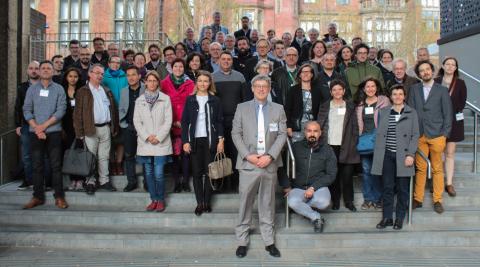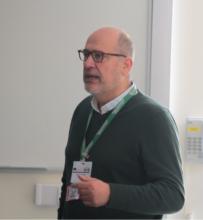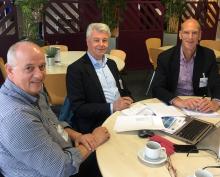Feed-a-Gene annual meeting 2018
The third annual meeting of the Feed-a-Gene project took place on 24-26 April 2018 in Newcastle upon Tyne, United Kingdom. It was hosted by the Newcastle University, one of the project partners. The meeting was attended by 68 people. During this meeting, Feed-a-Gene partners presented the work done so far, shared their results and planned activities for the next year. All attendees appreciated the organization of the meeting by Prof. Ilias Kyriazakis and his team at University of Newcastle. Feed-a-Gene project coordinator Jaap van Milgen and project manager Vincent Troillard would like to thank all the people at UNEW who made this meeting possible and enjoyable.
A year of results
During the meeting, young researchers (PhD and post-doc) were put in the spotlight and presented 10 oral communications. Other researchers presented their results during a poster (14 posters) session. These presentations showed the progress done in all work packages since the last scientific event (EAAP meeting in Tallinn in August 2017) for which a book of abstracts had been published. It was stressed that results of dissemination and related communications had substantially increased since 76 documents have been submitted: peer-reviewed papers, communications, posters, book chapters, PhD dissertations and technical papers. 56 have already been published and among them 9 are peer-reviewed papers.
Prof. Ilias Kyriazakis presented PROHEALTH, a FP7 European animal health project funded to help combat production diseases of pigs and poultry. PROHEALTH aims to increase the understanding of animal pathologies linked to the intensification of production and it helps providing effective control strategies to reduce the impact on animal welfare, including health. The project is in its last year of implementation and many interesting results are already available (www.fp7-prohealth.eu).
Sharing data in the context of Open Science
Following the lectures held in the previous meetings about data management (FAIR data management by Richard Finkers/WUR in 2016; Lightweight data management by François Moreews/INRA in 2017), Feed-a-Gene coordinator Jaap van Milgen presented the results of a survey carried out this year among Feed-a-Gene researchers.
Out of 66 researchers who answered, 65% had made publications involving data, algorithm, software or prototypes, and 75% of those researchers were willing to make them available. The preferred mode of dissemination was a data repository (45%), followed by making the material available upon request (32%), and by providing the data as supplementary material (25%). No researcher was in favour of making the data available upon payment. The preferred type of repository was that of the researcher’s organisation (43%). The preferred condition for making the material available in a public repository was that the authors be cited (42%).
SAB recommendations: keep focusing on stakeholders expectations
The stakeholder advisory board (SAB) attended the 3rd annual meeting and reaffirmed its interest in the programme. Stakeholders highlighted the fact that the multi-actor, multi-approach used in Feed-a-Gene is a challenging experience but also a great opportunity for very positive outcomes such as the integration of breeding and feeding. While science and project management are well done and partners are fully involved in the project, care should be taken to fulfil stakeholders expectations, particularly those of farmers, industry and policy makers. Communication towards stakeholders should be in the form of practical abstracts, policy briefings, and press releases. For higher impact on these categories of stakeholders, Life Cycle Assessment results and answers provided in the consumers questionnaire should be highlighted in all communication materials.





